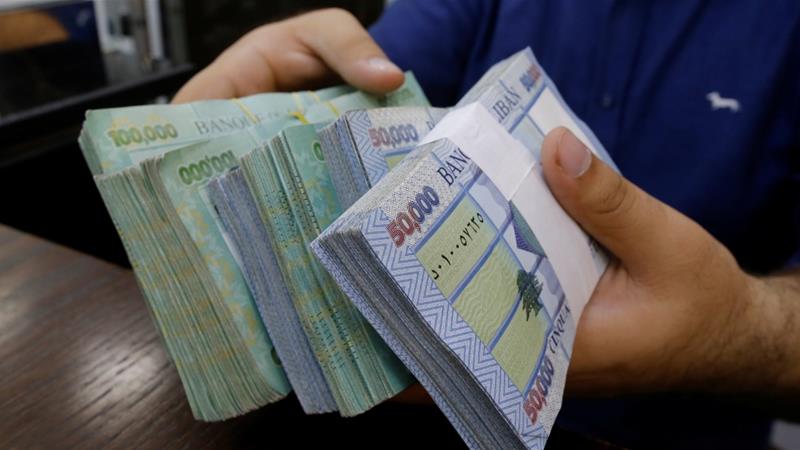The cash will be disbursed at a market rate set daily on an online platform. A senior banking source told Al Jazeera that the platform is expected to be ready within a week to 10 days, at which point the new measures may go into effect.
The decision was made public in a circular released by Lebanon’s central bank. It will allow people with accounts containing $3,000 or less to withdraw their money in Lebanese pounds at the market rate, which is substantially higher than the official rate.
The market rate on Friday stood at 2,800 Lebanese pounds to the United States dollar, compared to the official rate of 1,500 Lebanese pounds to the dollar, according to a daily survey of exchange dealers across the country, published online.
Lebanon’s currency has been pegged to the dollar at 1,500 Lebanese pounds for 23 years, but began depreciating on parallel markets last summer due to unsustainable financial policies that cracked under an acute dollar shortage. The dollar shortage was the result of a decade-long economic slump and a slowdown in remittances from Lebanon’s large diaspora.
Suffering from a dollar liquidity issue, banks imposed increasingly harsh capital controls in November. Depositors had only been allowed to withdraw a few hundred dollars per month from dollar-denominated accounts, forcing many to withdraw cash in Lebanese pounds at the official rate, which was substantially less than the market rate and thereby caused them to incur significant losses.
The decision also allows people with accounts in local currency under five million Lebanese pounds ($3,330, at the official rate) to convert their money into dollars at the official rate and then withdraw it in Lebanese pounds at the higher parallel rate.
For example, a depositor with three million Lebanese pounds in his or her account would be able to convert it to $2,000 and then convert it back to Lebanese pounds at the market rate of 2,800 Lebanese pounds to the US dollar, which would equal 5.6 million Lebanese pounds. This means the account holder will effectively double his money.
‘Liraficaiton:’ 1.7 million people to be affected
The decision’s parameters apply to roughly 60 percent of accounts in Lebanon, worth a total of around $1bn. Jad Chaaban, associate professor of economics at the American University of Beirut, said 1.7 million people will be affected.
But Chaaban said that “what is portrayed as something beneficial is actually a forced conversion to Lebanese pounds at a market rate, and it’s not a clear rate.”
“In effect, it cleans up the balance sheets of banks because they can ‘get rid’ of 1.7 million small depositors. Instead of these people trying to come and withdraw $100 to $200 every two weeks, [the banks] give it to them one time and in Lebanese pounds,” Chaaban said.
While the recent decision affects only a small fraction of the Lebanese banking system’s more than $150bn in total deposits, analysts see it as the first step in permanently converting dollar deposits into the local currency, a process known colloquially as “liraficaition.”
“Given the large dollar gap in the system, it’s unlikely that depositors will be getting their deposits back in dollars.” Mike Azar, a financial advisor and former lecturer in economics at Johns Hopkins University, told Al Jazeera.
“The government committed to protecting 90 percent of depositors, but [the central bank’s decision] nudges them into accepting liras instead of dollars.”
A win for banks and elites, but how about depositors?
Despite the criticism, the banking source tells Al Jazeera the move is a win-win for both banks and depositors.
Banks, which have faced an outburst of widespread anger over the limitations on dollar withdrawals that led dozens of branches to be vandalised and even set on fire, will now be able to give people local currency at an acceptable rate.
Meanwhile, people who had already been struggling to pay for basic needs under the economic crisis – and who now face the additional pressure of coronavirus pandemic – will be given some breathing room.
“You’re giving a large portion of the population access to money, so basically they won’t go out on the streets and burn the banks anymore,” Omar Tamo, a Lebanese foreign exchange specialist, told Al Jazeera.
In the short term, Tamo said the decision might also ease widespread anger against the country’s entrenched political elite, a sentiment that stoked an unprecedented uprising in the country last October.
Those elites “can now say they are working to protect people,” he said
‘Further devaluation’
Analysts also warned that Friday’s circular might lead the Lebanese pound to rapidly depreciate on the parallel market because a large amount of local currency would suddenly become available, while dollars remain scarce.
“You have a huge risk of sudden dollar-price increase because you have a bunch of liras for very limited dollars,” Tamo said.
Those with even a small amount of local currency to spare would have an incentive to exchange them into dollars due to the volatility of the Lebanese currency, he said.
The banking source concurred: “If people take this money to buy dollars and then stack it at home, there will be more pressure, and the price could go higher.”
“It depends on the reaction, but I think this category of small depositors usually need to spend and shouldn’t be stacking money at home.”
SOURCE: AL JAZEERA NEWS
